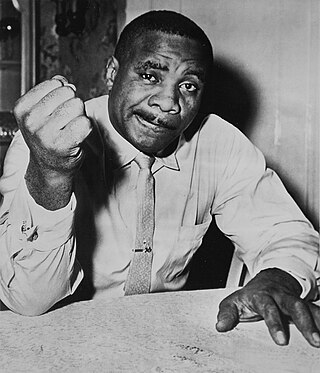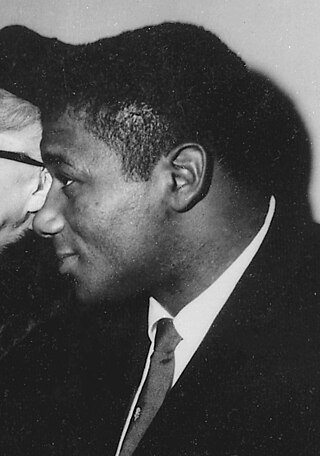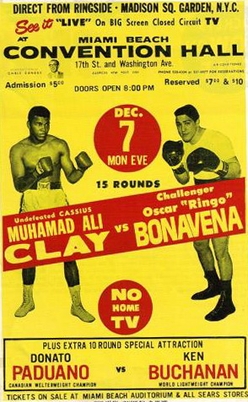
Muhammad Ali was an American professional boxer and activist. Nicknamed "the Greatest", he is regarded as one of the most significant sports figures of the 20th century and is often regarded as the greatest heavyweight boxer of all time. He held the Ring magazine heavyweight title from 1964 to 1970. He was the undisputed champion from 1974 to 1978 and the WBA and Ring heavyweight champion from 1978 to 1979. In 1999, he was named Sportsman of the Century by Sports Illustrated and the Sports Personality of the Century by the BBC.

Charles L. "Sonny" Liston, nicknamed "The Big Bear", was an American professional boxer who competed from 1953 to 1970. A dominant contender of his era, he became the world heavyweight champion in 1962 after knocking out Floyd Patterson in the first round, repeating the knockout the following year in defense of the title; in the latter fight he also became the inaugural WBC heavyweight champion. Often regarded as one of the greatest boxers of all time, Liston was particularly known for his immense strength, formidable jab, long reach, toughness, and is widely regarded as the most intimidating man in the history of the sport.

Floyd Patterson was an American professional boxer who competed from 1952 to 1972, and twice reigned as the world heavyweight champion between 1956 and 1962. At the age of 21, he became the youngest boxer in history to win the title, and was also the first heavyweight to regain the title after losing it. As an amateur, he won a gold medal in the middleweight division at the 1952 Summer Olympics. He is recognised as one of the best heavyweights of all time.

Robert Wayne Foster was an American professional boxer who fought as a light heavyweight and heavyweight. Known as "The Deputy Sheriff", Foster was one of the greatest light heavyweight champions in boxing history. He won the world light heavyweight title from Dick Tiger in 1968 via fourth-round knockout, and went on to defend the title fourteen times against thirteen different fighters in total from 1968 to 1974. Foster challenged Joe Frazier and Muhammad Ali during his career, but was knocked out by both. He was named to Ring Magazine's list of 100 Greatest Punchers of all time. He was also named to Ring Magazine's list of the 80 Best Fighters of the Last 80 Years, ranking at #55. He was inducted into the International Boxing Hall of Fame in the inaugural class of 1990.

Joe Frazier vs. Muhammad Ali, billed as The Fight of the Century or simply The Fight, was an undisputed heavyweight championship boxing match between WBA, WBC, and The Ring heavyweight champion Joe Frazier and Lineal champion Muhammad Ali, on Monday, March 8, 1971, at Madison Square Garden in New York City.

George Louis Chuvalo is a Canadian former professional boxer who was a five-time Canadian heavyweight champion and two-time world heavyweight title challenger. He is known for having never been knocked down in his 93 bout professional career including fights against Muhammad Ali, Joe Frazier, and George Foreman. Chuvalo unsuccessfully challenged Muhammad Ali for the heavyweight championship in 1966. Chuvalo was inducted into the Ontario Sports Hall of Fame in 1995.
During the 1960s, boxing, like mostly everything else around the world, went through changing times. Notable was the emergence of a young boxer named Cassius Clay, who would, in his own words shock the world, declare himself against war, and change his name to Muhammad Ali.

The two fights between Muhammad Ali and Sonny Liston for boxing's World Heavyweight Championship were among the most controversial fights in the sport's history. Sports Illustrated magazine named their first meeting, the Liston–Clay fight, as the fourth greatest sports moment of the twentieth century.

Zora "Bell" Folley was an American heavyweight boxer who was a top 10 contender for eleven years in a row from 1956 to 1966 and a nine-time top 5 contender throughout his career, reaching a peak as number 1 contender in 1959. He beat top contenders such as Eddie Machen, George Chuvalo, Oscar Bonavena, Henry Cooper, Bob Foster, Nino Valdez, Doug Jones, Johnny Summerlin, Bob Cleroux and drew (tied) against Karl Mildenberger.

Edward Mills "Eddie" Machen was an American professional boxer. He was one of 6 children of a rural mail carrier. Machen dropped out of high school and became an amateur boxer. However, after just 3 bouts he was arrested and convicted of armed robbery. After his release, he became a professional boxer, determined never to return to prison again. His 64-bout career began on March 22, 1955, and he went on to win his first 24 bouts. He was highly rated and fought most of the big names of his era and He defeated the important names of his period such as Bob Baker, Jerry Quarry, Niño Valdés, Joey Maxim, Willi Besmanoff, Tommy Jackson, Brian London, Howard King and Doug Jones (boxer)
Doug Jones was an American heavyweight boxer. He was the number one contender in early 1964 and beat top contenders such as Zora Folley, Light Heavyweight Champion Bob Foster, Middleweight World Champion Bobo Olson and World Heavyweight Title Challenger's Pete Rademacher and Tom McNeeley in his career. He was best known for his 1963 fight with Cassius Clay which resulted in a close fight, but he lost by Unanimous decision.

I Am the Greatest is a comedy album by boxer Cassius Clay, released in August 1963 – six months before he won the world heavyweight championship, publicly announced his conversion to Islam, and changed his name to Muhammad Ali. It was released by CBS Columbia. The album helped establish Ali's reputation as an eloquently poetic "trash talker". The album has also been identified as an early example of rap music and a precursor to hip hop music.
Muhammad Ali and Henry Cooper fought two boxing matches with each other in London. Their first match took place on 18 June 1963 and the second on 21 May 1966. Ali won both matches. The first fight was stopped by the referee in the fifth round, and the second in the sixth round. Both fights were stopped after Cooper started bleeding excessively from a cut to the left eye. The first Ali-Cooper bout is remembered for being one of the four fights in which Ali was officially knocked down in the ring by his boxing opponent, as well as leading to the mandate that ringside handlers always have an extra pair of boxing gloves available.

Muhammad Ali vs. Oscar Bonavena was a professional boxing match contested on December 7, 1970, for the NABF and Lineal heavyweight championship at Madison Square Garden in New York City on December 7, 1970.
Muhammad Ali vs. Ernie Terrell was a professional boxing match contested on February 6, 1967, for the WBA, WBC, NYSAC, and The Ring heavyweight championships. The fight went 15 rounds, with Ali winning through a unanimous decision.
Cassius Clay vs. Sonny Banks was a professional boxing match contested on February 10, 1962.
Cassius Clay fought Argentine Alex Miteff in a ten-round boxing match in Louisville on October 7, 1961. Clay won the fight through a technical knockout when the referee stopped the fight in the sixth round. Miteff and Clay would feature in the 1962 film Requiem for a Heavyweight.

Cassius Clay fought an eight-round boxing match with Texan Donnie Fleeman in Miami on February 21, 1961. Prior to this fight, Fleeman had a record of 51 fights with 45 wins including 20 knockouts. Clay won the bout through a technical knockout after the referee stopped the fight in the seventh round. This was the first time Clay had gone over six rounds in a boxing match. It was also the first time Fleeman had ever been knocked down in a boxing match. Fleeman retired from boxing after this fight.

Muhammad Ali was a boxer who mastered the rope-a-dope fighting technique. He is widely regarded by many boxing commentators and historians as the greatest heavyweight boxer of all time. Boxing magazine The Ring named him number one in a 1998 ranking of greatest heavyweights from all eras. In 1999, The Associated Press voted Ali the number one heavyweight of the 20th century.
Anthony Perez was an American boxing referee and judge of Puerto Rican descent. During his career, he refereed many major boxing fights and participated in a number of boxing related documentaries.












